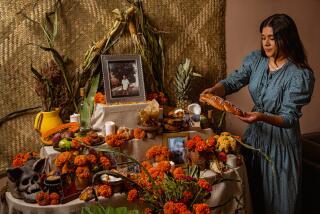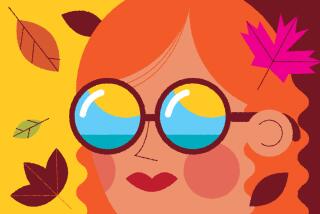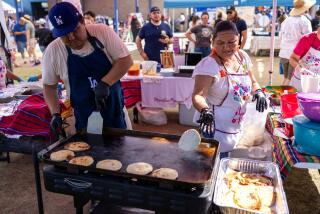Parties, Piety Merge in Peace Pursuit
- Share via
CARACAS, Venezuela — Incense mingles with the aroma of home-cooked stew, as neighbors leave their shanties jammed against one another here in the capital’s Sucre neighborhood and take their places before a makeshift altar on a steep, narrow road.
Palms raised for prayer, they face a cross covered in carnations, roses and jasmine, lit by candles and accompanied by statues of saints. Woven palm branches tied with white ribbons arc over the display.
“We ask this sacred cross, before us now, to protect us--to eliminate violence in our homeland, to protect our homeland, and help us reach peace,” says prayer leader Oscar Larrua, raising a rosary toward the night sky. Eyes close in concentration, the crowd echoes the prayer for half an hour--then erupts in rowdy celebration.
Such festivals take place throughout Venezuela each spring to usher in the rainy season, pray for a prosperous harvest, pay homage to nature--and hope for a respite from the political tensions and crime that grip this South American country.
Brought to Venezuela by Spanish colonialists, the ritual has evolved to include indigenous, Afro-Caribbean and more modern elements. Improvised altars with the blossom-draped cross as the centerpiece dot street corners, hillsides and plazas across the country. Originally a rural observance, poor migrants brought the festival to Caracas.
In Sucre, residents have put on the ritual for 18 years, praying for an end to crime, drugs and political instability.
“This street is very united,” said Omaira Aviarez, 55, who introduced the festival locally. “Everyone pitches in to make the altar. The neighbors all lend their own saints. Look, the kids help too,” she added, pointing to a row of miniature altars made by children.
Sucre residents are proud that their ceremony has become famous in Caracas. City leaders borrowed their colorful cross for a tribute to people killed in riots and protests during a short-lived coup in April against President Hugo Chavez.
“I’m praying especially for peace so that we can end divisions,” university student Myriam Brito said. “The rich are always on their side, and the poor on this side,” she added, taking a sip of calentado, a warm licorice drink.
There is no specific date for the ritual. Neighborhoods put on the outdoor festivities any night they wish.
Feasts are always a potluck of homemade traditional Venezuelan dishes: hallacas, tamales wrapped in plantain leaves; sancocho, a chicken stew with chunks of yucca, potatoes and plantain; various fruit-based sweets.
The partying lasts all night. In steaming coastal towns, descendants of African slaves beat polished, hollow logs, called tambores, and villagers circle around couples performing a sensual stomping dance. In the southwestern plains, cowboys play guitars and croon romantic and patriotic tunes.
At Sucre’s festival, a neighborhood band plays violins, maracas and cuatros--traditional Venezuelan guitars with four strings. Someone passes around a bottle of rum. Cheers erupt when an old woman brings out calentado from her native Andean mountain town. After midnight, everyone digs into the sancocho and downs another round of calentado.
But before the carousing comes piety. During the prayer service, a group of toddlers shriek down the hill on scooters. Elderly women in faded frocks admonish them, and they sheepishly abandon their scooters and scurry to squat before the altar.
More to Read
Sign up for Essential California
The most important California stories and recommendations in your inbox every morning.
You may occasionally receive promotional content from the Los Angeles Times.













